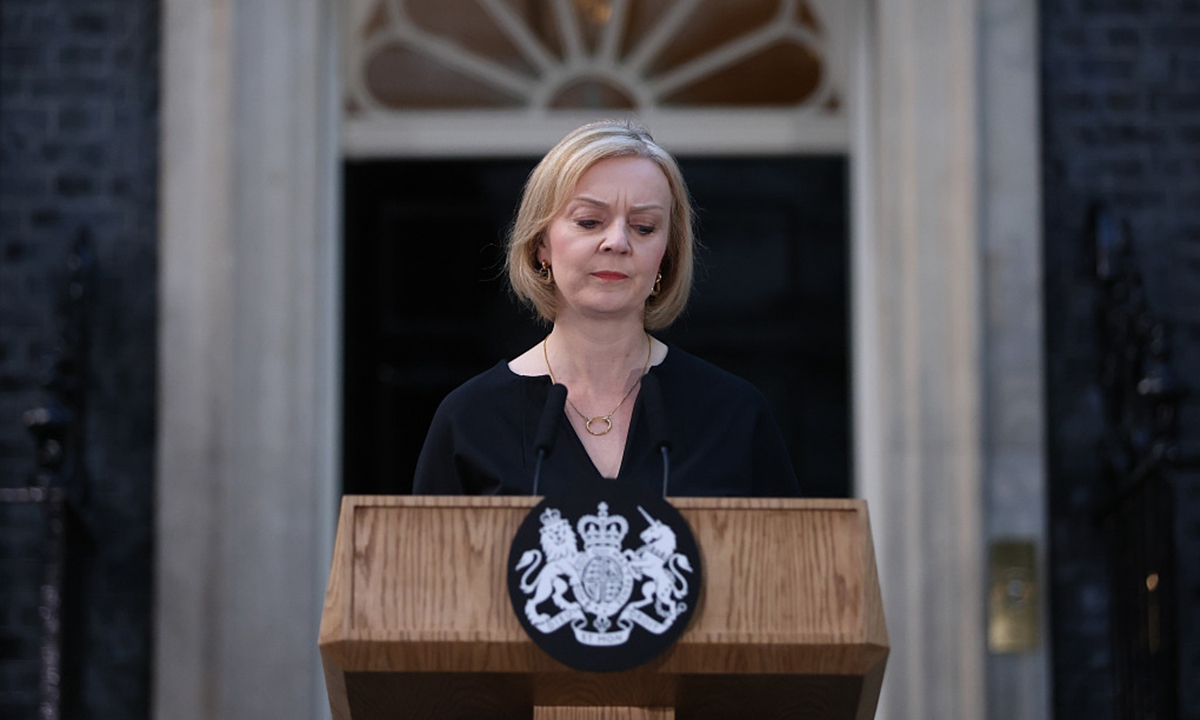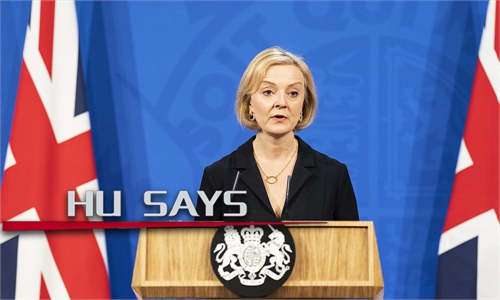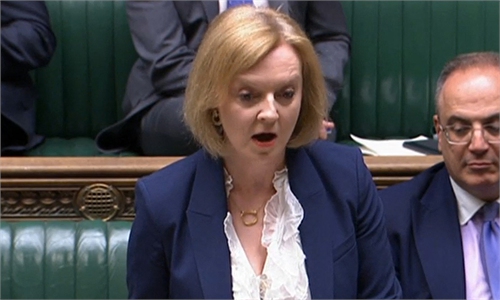
UK Prime Minister Liz Truss Photo:VCG
UK Prime Minister Liz Truss, who has been in office for just about 40 days, is fighting for her political survival as more than 100 members of parliament (MPs) belonging to her Conservative Party are threatening to force her to step down as early as this week, amid the discontent over her chaotic economic strategy and pressure from the opposition Labour Party.
Chinese analysts said that the chaotic political situation in the UK underscored that the country's governance system is becoming increasingly inadequate for coping with a confluence of social and political challenges. The UK's national interests have been hijacked by the self-interests of politicians and political parties, and its institutional problems cannot be solved just by ousting Truss, they added.
Quoting unnamed sources, the UK's Daily Mail reported on Sunday that more than 100 MPs are ready to submit a letter of no confidence in Truss to Graham Brady, the head of the Tory's 1992 Committee, which organizes the leadership contest.
The MPs, some of whom have held a secret discussion on ousting Truss, are expected to urge Brady to tell Truss that "her time is up" or to change party rules to allow an immediate vote of confidence in her leadership, UK media reported. Under current rules, the prime minister cannot be challenged by no-confidence vote within a year of taking office.
One former cabinet minister said they thought it was "50/50 whether she will make it till Christmas," according to a Guardian report. A Tory MP, who has backed Truss since the leadership contest, told the Guardian that Truss' authority is "shattered" and "people want it done this week."
In response, Downing Street warned that ousting Truss could trigger a general election, at a time when the opposition Labour Party is performing better in opinion polls.
Truss, who won the contest to replace Boris Johnson as Conservative Party leader and prime minister in September, sacked her finance minister Kwasi Kwarteng on Friday and scrapped parts of her economic package on tax cuts, which has proved to be a failure and drawn a huge wave of opposition.
Truss then appointed Jeremy Hunt, a former foreign and health secretary who had backed Rishi Sunak over her, to replace Kwarteng, after weeks of financial turmoil and doubts over the recently proposed mini-budget. Analysts viewed the move as Truss attempting to find a balance among Tories, according to BBC.
Experts said that Truss' chaos has put the Tories in a dilemma, as frequent changes of leader would further undermine their popularity among the public, but the absence of a no-confidence vote to oust Truss could also be harmful for the Tories' popularity in the long run.
The UK has lost three prime ministers since it left the European Union in 2016. All of them are Conservatives (David Cameron, Theresa May, and Boris Johnson).
Cui Hongjian, director of the Department of European Studies at the China Institute of International Studies, told the Global Times on Monday that such a practice in the UK has become problematic for the country.
No party in the UK has had a long-term or structural plan for dealing with the country's considerable problems, even when Johnson was prime minister and the Tory had a majority in Parliament, Cui noted.
Zhang Bei, assistant research fellow at the Department for European Studies of Beijing-based China Institute of International Studies, told the Global Times that the UK's pragmatism was widely acknowledged, but in recent years it has put a strong emphasis on ideology, not only in foreign policy but also in elections, as evidenced by Truss' recent victory.
Many of Truss' propositions were strongly populist and she used slogans to cater to supporters, but politicians don't want to take responsibility when things go wrong, Zhang said.
In the UK, where party politics prevails, politicians pursue personal interests rather than the national interest. In fact, the national interest has been hijacked by the personal interests of political parties and politicians, which is a prominent problem, Zhang said.
Experts noted that there is no guarantee that Truss' successor will do any better in such a populist environment, given that politicians' personal character and ability to govern reveal many problems, and that the UK system does not work well for transitions.



